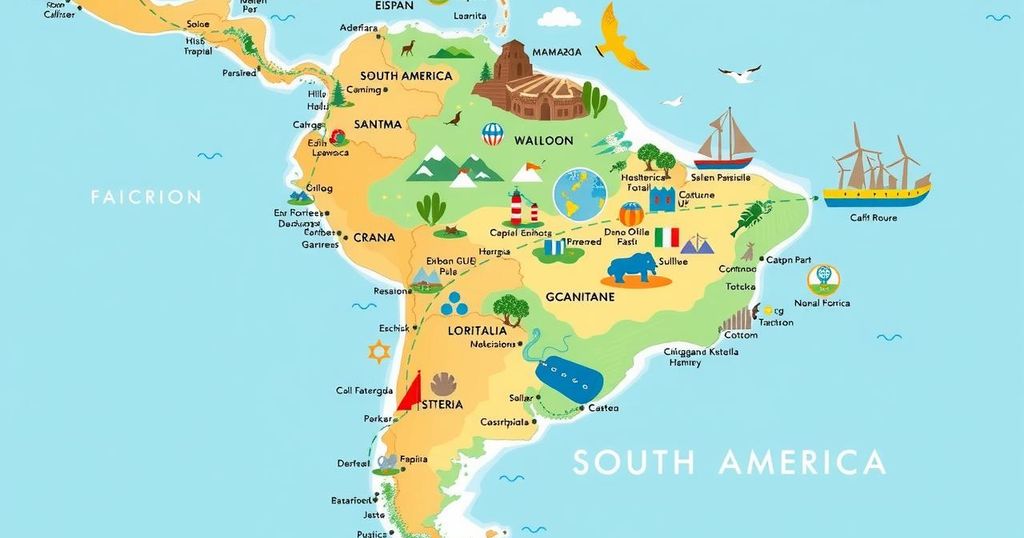Canada is exploring trade diversification with South America amid rising U.S. protectionism. The Mercosur trade bloc offers potential benefits, but experts question the effectiveness of pursuing this agreement compared to existing partnerships with Asia and Europe. The need for a strategic approach is highlighted as Canada seeks new commercial relationships.
Recent trends in American protectionism are driving Canada to explore new trade partnerships, particularly with the South American trade bloc, Mercosur. Rambod Behboodi, an international trade lawyer, emphasizes that as the U.S. becomes an unpredictable partner, Canada must seek commercial relationships beyond North America.
Mercosur, which stands for Mercado Común del Sur, was established in 1991 by Argentina, Brazil, Paraguay, and Uruguay to facilitate trade by eliminating customs duties among member countries and implementing a common external tariff averaging 11.5%. Venezuela was suspended in 2016, and Bolivia became a full member in 2024.
Negotiations for a Canada-Mercosur free trade agreement began in 2018 but have yet to yield results. The European Union recently completed its trade negotiations with Mercosur, highlighting the competitive pressure Canada faces. Behboodi points out that if Canada fails to secure a deal, it risks losing trade opportunities in South America, especially as the EU gains an edge.
Canada’s exports to Brazil have shown promising growth, reaching $6.31 billion last year, while imports from Canada dropped by 18% due to currency devaluation. Hilton Nascimento from the Chamber of Commerce Brazil-Canada noted that bilateral trade has expanded by more than 60% over the last decade, indicating a strengthening relationship.
Evelyne Coulombe, Canada’s ambassador to Germany, advocates for finalizing a free trade accord with Mercosur, citing it as a chance to enhance trade ties with Brazil and Europe. She believes sectors such as oil, gas, renewable energy, and IT would particularly benefit from collaboration and technology exchange.
However, Fen Olser Hampson of Carleton University raises skepticism about the benefits of a Canada-Mercosur agreement, noting similarities in export products between Canada and Brazil, including beef, poultry, and crude petroleum, which could complicate trade dynamics.
Hampson suggests that instead of focusing on Mercosur, Canada should strengthen trade with Asia and Europe, aiming for commodities, agriculture, and energy trade. Canada already maintains 15 free trade agreements with countries like Chile, Colombia, and Peru, which could be leveraged further.
Bernardo Blum from the Rotman School of Management recommends analyzing the EU-Mercosur agreement’s impact to gauge the potential benefits for Canada. The EU deal, recently signed, eliminates tariffs on over 90% of trade, reflecting a mutual dependency between the EU and Mercosur countries.
Despite the potential an agreement holds, Blum remains doubtful about its effectiveness, citing the Canada-EU Comprehensive Economic and Trade Agreement (CETA). Although CETA aimed to reduce barriers, only 65% of Canadian exports utilized its benefits in 2021, demonstrating a broader issue of firms not fully engaging with trade deals.
Ultimately, Blum expresses that the anticipated effects of a Canada-Mercosur agreement may not be substantial, reinforcing the need for Canada to rethink its trade strategies in light of evolving global dynamics and protectionist pressures.
In summary, Canada is exploring trade diversification in response to increasing U.S. protectionism, with South America, specifically Mercosur, presented as a potential partner. While the Canadian government recognizes the need for a trade agreement with Mercosur to unlock growth opportunities, experts express skepticism regarding its feasibility and effectiveness compared to existing and future trade relationships with Asia and Europe. Careful consideration of potential trade agreements and their real-world implications is essential as Canada navigates its trade landscape.
Original Source: financialpost.com






